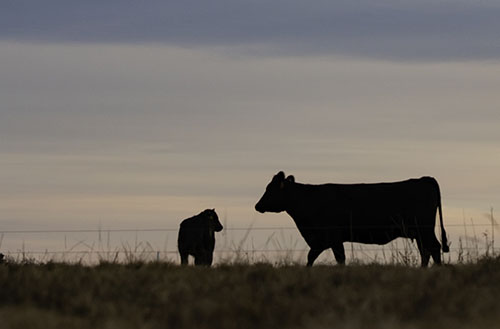Neonatal Calf Diarrhea
Nov 16, 2020

As farmers plan for fall/winter calving season, neonatal diarrhea will soon become a concern for many beef producers. This condition has a myriad of causes that can range from very mild, self-limiting diarrheas to severe, often fatal episodes. As we examine some of the causes of calf diarrhea and begin to talk about how to control this troublesome condition, it is important to note management and care of the brood cow is as, if not more, important than the condition of the newborn calf. Certainly proper nutrition status of the cow is critical as a well fed cow always has a better opportunity to milk. Cows that milk well and provide the calf with strong colostrum have calves with stronger immune systems and are much less likely to be attacked by one of these diarrhea diseases.
Some of the common causes of neonatal diarrhea include E. coli, rotavirus, corona virus, and C. perfringens type C. All of these can cause diarrhea in the first days of life up about 1-2 months of age. The two viral diseases (Rota and corona viruses) tend to be slightly less fatal and are somewhat self-limiting. The other two are bacteria and are much more severe often ending in death of the calf. Regardless of etiology, the main concern is dehydration. The calves loose fluid through diarrhea and often don’t feel well enough to nurse or drink so they become dehydrated. Electrolyte supplementation is also extremely important since many important electrolytes are lost through diarrhea. Antibiotics are almost always recommended since it is difficult to distinguish the cause. Even if the diarrhea is caused by a virus, antibiotics can be effective against secondary bacterial invaders.
Since treatment can be frustrating and sometimes unsuccessful, prevention may be the answer for many producers. The cow, again, is the target. There are many commercially available vaccines that can be given to the cow before she calves that will enable her to make strong colostrum against these diseases that will in turn help protect the calf from the diarrhea diseases. These vaccines come in combinations covering one or more of the earlier mentioned diseases. It is important to note these vaccines are labeled to be given to cows that are pregnant shortly before they calve. Depending on the vaccine, they may have to be given more than once during the interval before calving. While it may seem inconvenient, the vaccines are quite effective, and, in the face of loosing several calves, don’t seem so bad. If calf diarrhea is a serious problem, contact your local Co-op to get help with a vaccination protocol that could limit and hopefully eliminate neonatal diarrhea problems.
Some of the common causes of neonatal diarrhea include E. coli, rotavirus, corona virus, and C. perfringens type C. All of these can cause diarrhea in the first days of life up about 1-2 months of age. The two viral diseases (Rota and corona viruses) tend to be slightly less fatal and are somewhat self-limiting. The other two are bacteria and are much more severe often ending in death of the calf. Regardless of etiology, the main concern is dehydration. The calves loose fluid through diarrhea and often don’t feel well enough to nurse or drink so they become dehydrated. Electrolyte supplementation is also extremely important since many important electrolytes are lost through diarrhea. Antibiotics are almost always recommended since it is difficult to distinguish the cause. Even if the diarrhea is caused by a virus, antibiotics can be effective against secondary bacterial invaders.
Since treatment can be frustrating and sometimes unsuccessful, prevention may be the answer for many producers. The cow, again, is the target. There are many commercially available vaccines that can be given to the cow before she calves that will enable her to make strong colostrum against these diseases that will in turn help protect the calf from the diarrhea diseases. These vaccines come in combinations covering one or more of the earlier mentioned diseases. It is important to note these vaccines are labeled to be given to cows that are pregnant shortly before they calve. Depending on the vaccine, they may have to be given more than once during the interval before calving. While it may seem inconvenient, the vaccines are quite effective, and, in the face of loosing several calves, don’t seem so bad. If calf diarrhea is a serious problem, contact your local Co-op to get help with a vaccination protocol that could limit and hopefully eliminate neonatal diarrhea problems.